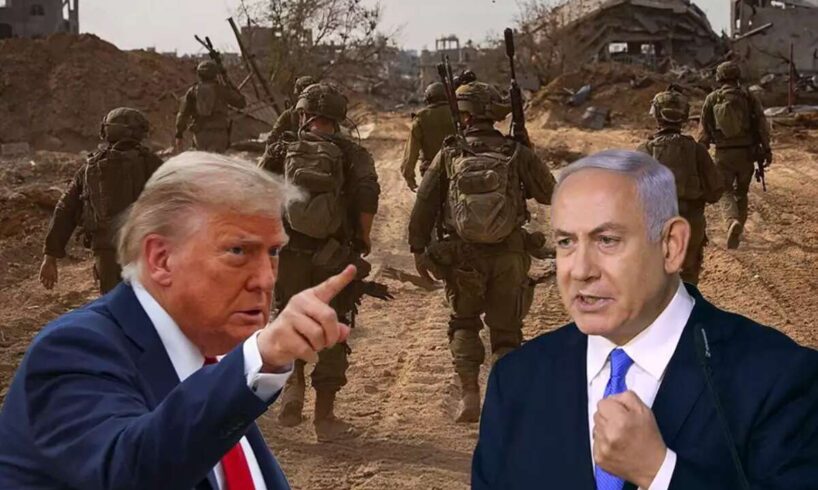
Prime Minister Benjamin Netanyahu will meet President Donald Trump in Washington on Monday evening to discuss the American proposal for ending the war, which is part of a broader framework addressing the Israeli-Palestinian conflict and expanding the Abraham Accords.
Trump hinted at its significance: “We have a real chance for greatness in the Middle East. All are on board for something special, first time ever, we will get it done,” he posted on social media.
The plan presented to Arab and Islamic representatives at Trump’s meeting last week is not final and has undergone adjustments in recent days during consultations.
IDF troops in the Gaza Strip. Photo: IDF Spokesperson’s Unit IDF Spokesperson’s Unit
According to American and Arab officials, disputes emerged during the meeting itself. Qatar, and to a degree Egypt, demanded that the clause requiring Hamas to disarm be altered. Egypt warned that Hamas would reject the plan if that clause remained.
The Qatari channel Al-Araby reported that the proposed change would require Hamas to “lay down its arms” but not to fully disband them. The United Arab Emirates and Saudi Arabia opposed the amendment. Both states are expected to send troops to the multinational force that would take responsibility for Gaza the “day after.”
As Israel Hayom reported earlier this year, a senior Saudi official said his country would not deploy soldiers “if even a single Hamas member remains armed with a single Kalashnikov.”
That section remains unresolved, as do several others. Among them is the role of the Palestinian Authority in the proposed interim technocratic administration in Gaza, which would operate under international supervision.
Israel opposes granting the PA significant authority, an objection supported by some Gulf states. These countries are conditioning any involvement by the PA on sweeping reforms: structural changes to curb corruption, a deradicalization process, and international oversight of reconstruction funds.
Over the weekend Netanyahu met with Emirati Foreign Minister Abdullah bin Zayed Al-Nahyan in a meeting described by both sides as dramatic and productive.
Gazans in the Strip receiving humanitarian aid from GHF. Photo: AFP AFP
An Arab diplomat told Israel Hayom that recent developments provide “a light at the end of the tunnel” in the complex war situation. He said leveraging the war’s conclusion into a broader political process for the conflict and the Middle East as a whole was both welcome and feasible.
“The Abraham Accords can and should be expanded, and if this move succeeds, the momentum will be greater than Israel expects,” he added.
On Sunday, Israel Hayom revealed that the deal also addresses areas in Judea and Samaria under Palestinian Authority control.
Arab and American sources disclosed that the plan includes rehabilitation of refugee camps in the West Bank, the cancellation of refugee status for their residents, the dissolution of UNRWA, far-reaching structural reforms in the Palestinian Authority, major changes to the education system as part of deradicalization, an expansion of that process to the wider population, and a ban on incitement.
The Gulf states would commit to significant investments in the PA – but only if it implements the reforms and commitments. An Israeli official told Israel Hayom that the international and Gulf demands for deradicalization in the PA were encouraging and held long-term advantages.
Another contentious clause is the timing and gradual nature of Israel’s withdrawal. Arab media reported that Qatar, which has effectively become Hamas’ representative in the talks, demanded a full withdrawal in the early stages of the deal.
Hamas terrorists in the Gaza Strip. Photo: AFP AFP
Israel and the US oppose this. Israel insists on maintaining a security buffer and a presence in the Philadelphi Corridor for the long term. The plan also stipulates that in each stage of withdrawal, the multinational force would replace the Israel Defense Forces.
But as of now, no such force is ready to deploy as long as Hamas refuses to give up its weapons. Egypt proposed that the initial force consist of Palestinians trained in Egypt, under joint Arab command.
Qatar forwarded the draft plan – still officially labeled a draft – to Hamas leaders. Although they claim they have not received it formally, it is expected that, as in the past, they will say they accept the plan but demand changes, meaning acceptance in principle but rejection in practice.
An American diplomat told Israel Hayom that the plan could serve as a framework for negotiations if Hamas does not impose too many obstacles. “Rejecting more than one or two clauses would mean there is no basis for talks. But if there are just one or two sticking points, negotiations based on this plan could lead to a breakthrough,” the official said.
Israeli officials estimate that Hamas will remain entrenched in its refusal to disarm and in its demand for an extensive Israeli withdrawal at the outset of any deal.





